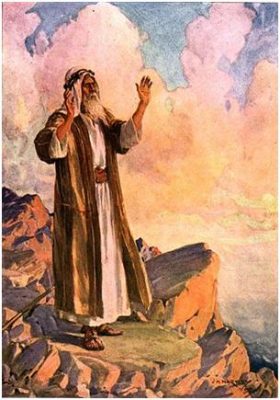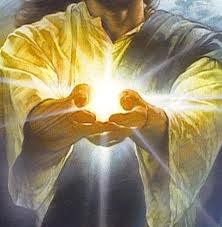Liturgical Readings for : Thursday, 14th March, 2024
Thursday, Fourth Week in Lent
Jesus reminds people that Moses pleaded for mercy from God for his continuing wayward followers.
A reminder to all of us to turn back to our God our Father.
FIRST READING
A reading from the book of Exodus 32:7-14
Do not bring this disaster on your people.

The Lord spoke to Moses,
‘Go down now, because your people whom you brought out of Egypt have apostasised. They have been quick to leave the way I marked out for them; they have made themselves a calf of molten metal and have worshipped it and offered it sacrifice. “Here is your God, Israel,” they have cried “who brought you up from the land of Egypt!‘ I can see how headstrong these people are! Leave me, now, my wrath shall blaze out against them and devour them; of you, however, I will make a great nation.’
But Moses pleaded with the Lord his God.
‘Lord,’ he said ‘why should your wrath blaze out against this people of yours whom you brought out of the land of Egypt with arm outstretched and mighty hand? Why let the Egyptians say, “Ah, it was in treachery that he brought them out, to do them to death in the mountains and wipe them off the face of the earth”?
Leave your burning wrath; relent and do not bring this disaster on your people.
Remember Abraham, Isaac and Jacob, your servants to whom by your own self you swore and made this promise:
I will make your offspring as many as the stars of heaven,
and all this land which I promised I will give to your descendants, and it shall be their heritage for ever.’
So the Lord relented and did not bring on his people the disaster he had threatened.
The Word of the Lord. Thanks be to God
Responsorial Psalm Ps 105
Response O Lord, remember me out of the love you have for your people.
1. They fashioned a calf at Horeb and worshipped an image of metal,
exchanging the God who was their glory for the image of a bull that eats grass. Response
2. They forgot the God who was their saviour, who had done such great things in Egypt,
such portents in the land of Ham, such marvels at the Red Sea. Response
3. For this he said he would destroy them, but Moses, the man he had chosen,
stood in the breach before him, to turn back his anger from destruction. Response
Gospel Acclamation Jn 6:63. 68
Glory to you, O Christ, you are the Word of God!
Your words are spirit, Lord, and they are life; you have the message of eternal life.
Glory to you, O Christ, you are the Word of God!
or Jn 3:16
Glory to you, O Christ, you are the Word of God!
God loved the world so much that he gave his only Son; everyone who believes in him has eternal life.
Glory to you, O Christ, you are the Word of God!
GOSPEL
The Lord be with you. And with your spirit
A reading from the holy Gospel according to John 5:31-47 Glory to you, O Lord
You place your hopes on Moses, and Moses will be your accuser.
Jesus said to the Jews
‘Were I to testify on my own behalf, my testimony would not be valid;
but there is another witness who can speak on my behalf, and I know that his testimony is valid.
You sent messengers to John, and he gave his testimony to the truth: not that I depend on human testimony;
no, it is for your salvation that I speak of this.

‘John was a lamp alight and shining and for a time you were content to enjoy the light that he gave. But my testimony is greater than John’s: the works my Father has given me to carry out,
these same works of mine testify that the Father has sent me.
Besides, the Father who sent me bears witness to me himself.
You have never heard his voice, you have never seen his shape,
and his word finds no home in you because you do not believe in the one he has sent.
‘You study the scriptures, believing that in them you have eternal life;
now these same scriptures testify to me, and yet you refuse to come to me for life!
As for human approval, this means nothing to me.
Besides, I know you too well: you have no love of God in you.
I have come in the name of my Father and you refuse to accept me;
if someone else comes in his own name you will accept him.
‘How can you believe, since you look to one another for approval and are not concerned with the approval that comes from the one God?
Do not imagine that I am going to accuse you before the Father: you place your hopes on Moses, and Moses will be your accuser.
If you really believed him you would believe me too, since it was I that he was writing about; but if you refuse to believe what he wrote, how can you believe what I say?’
The Gospel of the Lord. Praise to you, Lord Jesus Christ.
_________________________
Gospel Reflection Thursday Fourth Week of Lent John 5:31-47
The figure of Moses is to be found in both readings today and in the responsorial psalm. In the first reading, Moses intercedes with God on behalf of his rebellious people, and God listens to the prayer of Moses. The responsorial psalm, reflecting on this incident, says that ‘Moses, the man God had chosen, stood in the breach before him’. Moses stood in the breach between God and his people; he helped to keep God’s relationship with his people alive. In the gospel reading, Jesus declares that Moses was writing about him. What Moses said and did point ahead to the person of Jesus. Yet, Jesus was greater than Moses. He brought a fuller revelation of God than Moses ever did. Jesus stood in the breach between God and his people in a much more profound way. Whereas Moses is depicted as standing between an angry God and his people, Jesus stands between a loving God and his people, and, indeed, all humanity.
Jesus reveals God to be Love. Jesus cast a greater light upon God than Moses. It is because of Jesus that we can say that God loved the world so much that he gave his only Son so that we may have life and have it to the full. In the gospel reading, Jesus says that the works God his Father gave him to carry out testify to God, reveal God. The works Jesus refers to are all his deeds that brought life in its various forms to those he encountered. The death and resurrection of Jesus was an even fuller revelation of the God of love and life. We have much to be grateful for, because of all that Jesus has revealed to us about God, all that Jesus has brought to us from God. As the opening chapter of John’s gospel says, Jesus came full of God’s grace and truth, and from his fullness we have all received, grace upon grace.
______________________________________
The Scripture Readings are taken from The Jerusalem Bible, published 1966 by Darton, Longman and Todd Ltd











